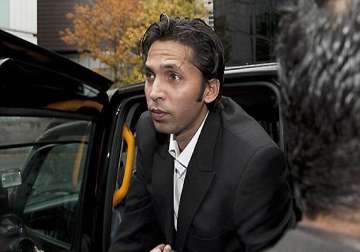Disgraced Pakistan Cricketer Duo's Appeal Rejected
London, Nov 23: Former Pakistan captain Salman Butt and his team-mate Mohammad Amir's appeals against their jail sentences in the spot-fixing case was today rejected by the Court of Appeal which said the players could

London, Nov 23: Former Pakistan captain Salman Butt and his team-mate Mohammad Amir's appeals against their jail sentences in the spot-fixing case was today rejected by the Court of Appeal which said the players could not be shown mercy as they had “betrayed their team and country”.
The Court of Appeal, headed by Lord Chief Justice Igor Judge, dismissed their appeals and upheld the prison terms handed to Butt and Amir for their role in one of cricket's biggest scandals.
“The cricketers betrayed their team, their country, the sport that had given them their distinction and all the world followers of the game,” the judge said.
“The reality is that all the enjoyment of watching cricket will be destroyed if this was allowed to continue. This is a notorious and essentially simple case. It was a betting scam and they were very well rewarded.”
Butt, 27, was sentenced to two and half years in jail on November 3 by the Southwark Crown Court after being convicted in the plot to ensure that no-balls were bowled at predetermined times during the fourth Test between England and Pakistan at Lord's last August.
The 19-year-old Amir pleaded guilty in the pre-trial hearing in September and was handed a six-month sentence in a young offenders' institution.
The third guilty player Mohammad Asif, 28, who was handed a one-year prison sentence, had also filed his appeal but his case is expected to be taken up later as he has changed his legal defence team after the Southwark Crown Court trial.
Butt and Amir were not present today at the Court of Appeal for the hearing before Lord Chief Justice Igor Judge, the head of the English judiciary, and two other judges.
The Lord Chief Justice, called the appeal against Butt's sentence “unarguable” and agreed to trial court judge Jeremy Cooke's view that he was the “orchestrator” of the whole episode.
Lord Judge said that “Butt was undoubtedly the most involved” and a “malign influence” as his duty as captain was to “stop” any whiff of corruption.
He added that Justice Cooke, who presided over the original trial case, was fully entitled to call Butt the “orchestrator.”
Regarding Amir, Lord Judge said the pacer was not so young so as not to know what he had committed.
“This prodigious talent has been lost to cricket for some years. Cricket will be the poorer for it. But he was not so young that he did not appreciate what he was doing,” the judge observed.
The defence team for Butt argued that the sentence was too severe. They outlined three types of match fixing: the outcome of the game, passages of play and spot-fixing and argued that Butt was involved in the least severe of the three.
Ali Bajwa, representing Butt, argued that his client's sentence was “manifestly excessive” and “out of proportion to the seriousness of the offence that was committed”.
He said although serious, it was at the “lower end of the scale” of such offences.
Bajwa described Butt as a broken man in a state of “ruin and disgrace”.
“The very fact of conviction and imprisonment amounted to exceptional punishment for Mr Butt,” he said.
Amir's defence team, headed by Henry Blaxland, urged the court that his six-month sentence should be downgraded to a suspended term of a length that would enable him to walk free immediately. However, the judge read out text messages sent to Amir by a separate fixer in Pakistan.